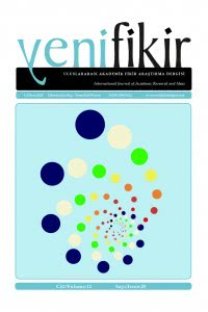1980 Sonrasında Yönetime Müdahale Girişimlerinin Dolar ve Borsa Üzerine Etkileri
Özellikle makro iktisat literatüründe, bir ülkenin ekonomisi yalnız pür ekonomik faktörlerle analiz etmek yetersizdir. Çünkü iktisadi olaylar son derece karmaşık olması yanında farklı sosyal ve politik bir arka plana da sahiptirler. Ana akım iktisadi analizler -bu karmaşıklığı gidermek için- iktisadi olay ve davranışları etkilemesi olası birçok unsurdan, sadece önemli ve doğrudan etkileyenlerini dikkate alır. Ancak iktisadi analizlerde, ekonomi dışı veya ilişkisiz gibi görünen bazı unsurların da ekonomiler üzerinde çok ciddi etkileri olduğu gözlenmektedir. Dolayısıyla bir ülke ekonomisi, siyasal, yargısal ve askeri kurumların ülke yönetimine ilişkin açıklama veya kararlarından hatta devlet üst kurumları arasındaki çatışmalardan ve terör gibi insanlık dışı eylemlerden etkilendiği açıktır. Özellikle Türkiye ekonomisinin yakın dönem gelişiminde, ekonomi politikalarından ziyade söz konusu kararlar, üst kurumlar arası uyum sorunları ve terör eylemleri önemli etkileyici ve belirleyici olmuştur. Ekonominin sağlıklı analiz edilmesi için bu unsurları birer değişken olarak göz önünde bulundurmak gerekir. Bu bildiride BİST İMKB, Borsa İstanbul ’in kuruluşundan sonraki dönemde teşebbüs edilen veya gerçekleştirilen, askeri darbe ve muhtıra dönemlerinin Türkiye ekonomisine etkileri, zaman serisi teknikleriyle incelenecektir. Bu amaçla 1985-2017 dönemi Borsa İstanbul verileri ile döviz fiyatları gibi yüksek periyodlu veriler kullanılarak, darbe veya muhtıra dönemlerinin ekonomi üzerinde oluşturduğu türbülanslar istatistiki ve ekonometrik yöntemlerle analiz edilecektir
Anahtar Kelimeler:
Askeri Müdahale ve Muhtıra, Makro Ekonomi, Ekonometri, 15 Temmuz Darbe Teşebbüsü, Türkiye
The Effects of Intervention Attemptsto Government on the Dollar and the Stock Market after 1980
Especially in the macroeconomic literature, it is insufficient to analyze the economics of an country with only economic factors. Because economic events are extremely complicated, they also have a different social and political background. The mainstream economic analyzes - in order to remove this complexity - take into account only the important and direct influences of the many factors that influence economic events and behaviors. However, in the economic analyzes, it is observed that some factors that seem to be non-economic or unrelated have very serious effects on the economies. Therefore, it is clear that the economy is influenced by political, judicial and military institutions' decisions about the country's government, even conflicts between institutions and acts of inhumanity such as terrorism. Especially in the recent performance of the Turkish economy, have been important determinants of economic policies. For a healthy analysis of the economy, these elements need to be considered as variables. In this paper, the effects of the military coup and memorandum, which were carried out or trained in the period after the establishment of the BIST The former IMKB, Istanbul Stock Exchange , on the Turkish economy will be examined as a time series. For this purpose, the turbulence created by shocks or memorandum periods on the economy will be analysed with high periodical data like BIST and foreign exchange by using econometric methods during 1985-2017 time periods
___
- ARSLAN, Ünal (2011), ‚Siyasi İstikrarsızlık ve Ekonomik Performans: Türkiye Örneği‛, Ege Akademik Bakış, Cilt: 11, Sayı: 1, ss. 73 -80.
- ARTAN,Seyfettin ve Pınar HAYALOĞLU (2014), ‚Kurumsal Yapı ve İktisadi Bü- yüme İlişkisi: Türkiye Örneği‛, Sosyoe- konomi, S. 2, ss. 352-355
- ASTERIOU, Dimitrios & Simon Price (2000), ‚Political Instability and Economic Growth: UK Time Series Evidence‛, Scottish Journal of Political Economy, 48(4), 383-399
- BEŞKAYA,Ahmet ve Ömer MANAN (2009), ‚Ekonomik Özgürlükler Ve Demokrasi İle Ekonomik Performans Arasındaki İlişkinin Zaman Serileri İle Analizi: Tür- kiye Örneği‛, ZKÜ Sosyal Bilimler Der- gisi, C. 5, S. 10, ss. 47–76
- DAWSON, John W. (2003), ‚Causality in the Freedom–Growth Relationship‛, Euro- pean Journal of Political Economy, 19, 479-495.
- GHABEN, Suad J. (2017), The Failed coup in Turkey ‚2016‛ and it's Impacts on Tur- key’s Foreign Policy, www.mpa.edu.ps/uploads/ ba5f817853273dafddcaf26e1c1082e0.pdf
- JONG-A-PIN,Richard (2006). ‚On the Measu- rement of Political Instabilityand its Im- pact on Economic Growth‛
- KARSAN, Gökhan ve Erhan Atay (2013), ‚A Comparatıve Analysıs Of Turkısh And Korean Polıtıcal Economy: Economıc Crısıs Perspectıve‛ Atatürk Üniversitesi İktisadi ve İdari Bilimler Dergisi, Cilt: 27, Sayı: 4, 2013 s. 272, , http://e- dergi.atauni.edu.tr/ atauniiibd/article/ view/1025009610/ 1025007798
- ÖZER, Ayhan ve Nah Jeong Won (2014),‚A Comparative Analysis of Economic Ef- fects of Coups at Turkey and Korea‛, In- ternational Proceedings of Economics Development & Research; Vol. 76, p. 10
- ÖZSAĞIR, Arif (2013), ‚Askeri Darbe ve Mü- dahalelerin Ekonomik Performans Üze- rine Etkisi: Türkiye Örneği‛, Gaziantep University Journal of Social Sciences, 12(4):759-773 ISSN: 1303-0094, (http://jss.gantep.edu.tr).
- SİDDİQUİ, Danish Ahmed & Qazi Masood Ahmed (2010), ‚Institutions and Econo- mic Growth: A Cross Country Eviden- ce‛, Mpra Paper, No. 19747.
- ŞANLISOY, Selim ve Recep Kök (2010), ‚Politik İstikrarsızlık - Ekonomik Büyüme İlişki- si: Türkiye Örneği (1987–2006)‛, Dokuz Eylül Üniversitesi İİBF Dergisi, 25 (1), 101-125.
- TORSTENSSON, Johan (1994), ‚Property Rights and Economic Growth: An Empi- rical Study‛ Kyklos, 47, 231-247
- ÜNAY,Sadık, Şerıf DİLEK (2017). “15 Temmuz: Başarısız Bir Darbe Girişiminin Ekonomi Politiği‛, SETA (Siyaset, Ekonomi Ve Toplum Araştırmaları Vakfı), Analiz, Ocak 2017, Sayı: 184, www.setav.org.
- ISSN: 1308-9412
- Başlangıç: 2009
- Yayıncı: Yeni Fikir Stratejik Araştırmalar Derneği
Sayıdaki Diğer Makaleler
Ortaokul Sosyal Bilgiler Dersi Coğrafya Ünitelerinde Öğrencilerin Öğrenme Yöntem Tercihleri
Suriyeli Mültecilerin İşgücü Piyasasına Etkisi
Elif DURSUN, Selin Sümeyra DEMİR
Hasan El-Benna ve Müslüman Kardeşlerin Vatan ve Milliyetçilik Kavramlarına Bakışı
